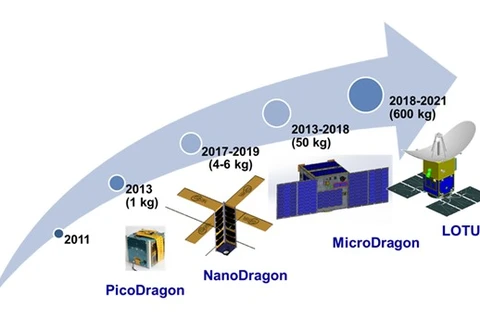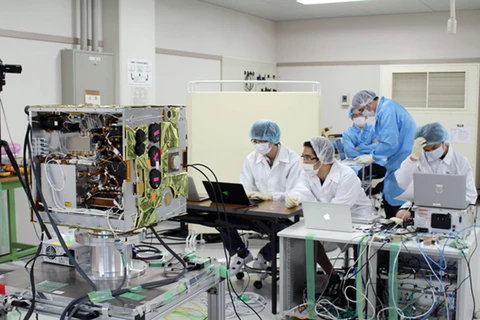Bangkok (NNT/VNA) – King Mongkut’s University of Technology North Bangkok (KMUT-NB) has successfully launched an 1U CubeSat named “Knacksat” into orbit.
Knacksat was launched into space on December 4, according to university President Suchart Siengchin.
Knacksat, which stands for King Mongkut’s University of Technology North Bangkok Academic Challenge of Knowledge Satellite, is a cube-shaped satellite measuring 10x10x10 centimetres with a total mass of approximately 1 kilogram. The miniature cube-shaped satellite uses amateur radio frequencies for its data transmission between the ground base and the satellite
Knacksat is funded through a research funding program called Broadcasting and Telecommunications Research and Development Fund for the Public Interest, managed by the Office of The National Broadcasting and Telecommunications Commission (NBTC).
It is the first Thai satellite designed and built domestically by a team of Thai researchers and students at KMUT-NB. The success of the CubeSat project proves that Thailand is now ready to participate in the ever-growing space industry, which can potentially open up new opportunities for Thailand in the foreseeable future, Suchart commented.
Now in orbit, the miniature satellite can be used to capture imagery of the Earth’s surface from outer space with a resolution of 1-2 km per pixel, and conduct experiments to test the functioning of systems and devices designed to operate in outer space.– NNT/VNA
Knacksat was launched into space on December 4, according to university President Suchart Siengchin.
Knacksat, which stands for King Mongkut’s University of Technology North Bangkok Academic Challenge of Knowledge Satellite, is a cube-shaped satellite measuring 10x10x10 centimetres with a total mass of approximately 1 kilogram. The miniature cube-shaped satellite uses amateur radio frequencies for its data transmission between the ground base and the satellite
Knacksat is funded through a research funding program called Broadcasting and Telecommunications Research and Development Fund for the Public Interest, managed by the Office of The National Broadcasting and Telecommunications Commission (NBTC).
It is the first Thai satellite designed and built domestically by a team of Thai researchers and students at KMUT-NB. The success of the CubeSat project proves that Thailand is now ready to participate in the ever-growing space industry, which can potentially open up new opportunities for Thailand in the foreseeable future, Suchart commented.
Now in orbit, the miniature satellite can be used to capture imagery of the Earth’s surface from outer space with a resolution of 1-2 km per pixel, and conduct experiments to test the functioning of systems and devices designed to operate in outer space.– NNT/VNA
VNA
























